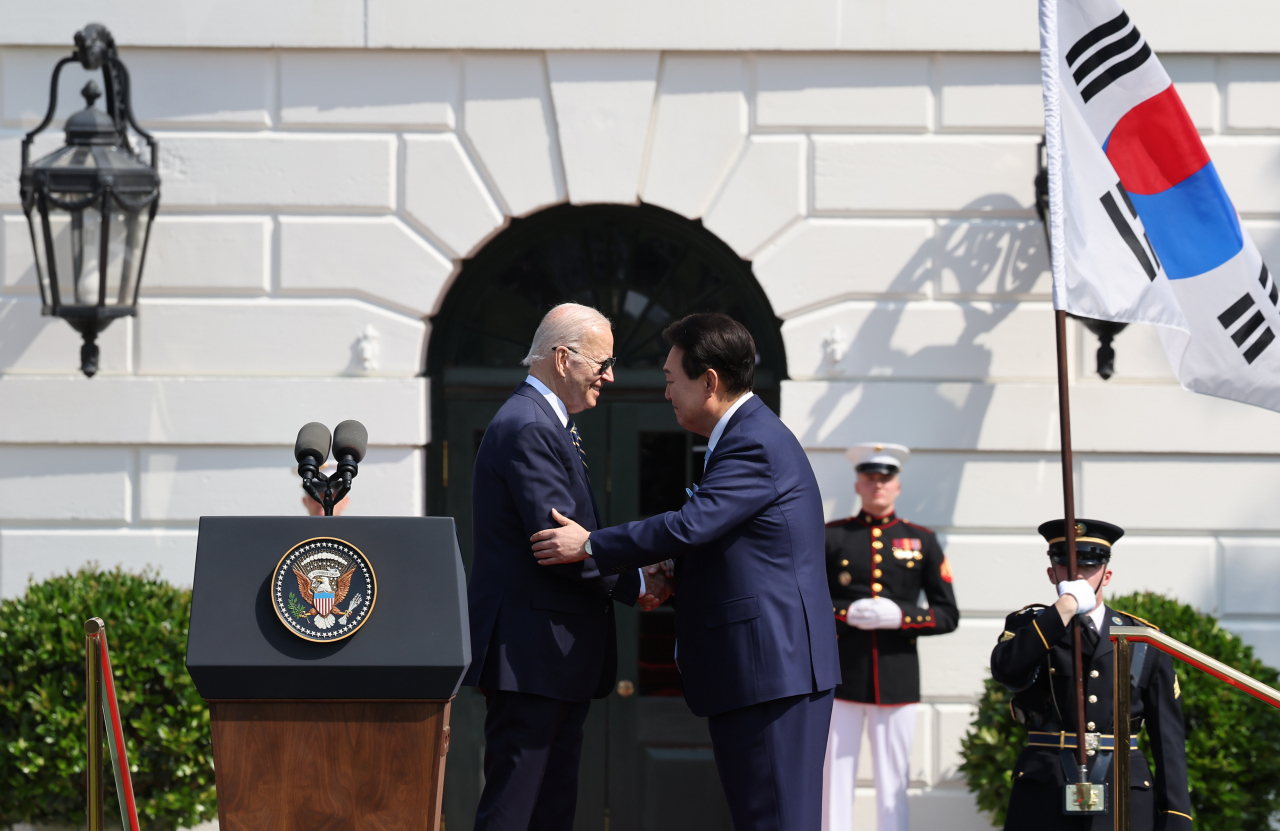Washington Declaration goes beyond 'nuclear-sharing': US official
By YonhapPublished : May 6, 2023 - 10:46

The recent agreement reached by South Korea and the United States on enhancing US extended deterrence is a historic step that goes beyond "nuclear-sharing," a US administration official told Yonhap News Agency on Friday.
The remark follows some ambiguity over whether the agreement, dubbed the Washington Declaration, is a nuclear-sharing agreement.
"The declaration moves beyond what could be characterized as nuclear sharing ... to address the more fundamental goal of developing a joint approach to military planning for, and operating in, nuclear contingencies, including through new exercises and simulations to improve operational readiness," the official said, asking not to be identified.
The declaration was signed last week by South Korean President Yoon Suk Yeol and US President Joe Biden during Yoon's six-day state visit to the US.
It was partly viewed as an attempt to end an ongoing debate in South Korea on whether the country should consider arming itself with its own nuclear weapons in the face of North Korea's escalating missile provocations and nuclear rhetoric.
The Washington Declaration states that Seoul has reaffirmed its nonproliferation obligations under the Nuclear Non-Proliferation Treaty.
Controversy broke out when South Korea's deputy national security adviser, Kim Tae-hyo, insisted that the agreement should make South Korean "feel that they are sharing nuclear weapons with the United States."
Edgard Kagan, special assistant to the president and senior director for East Asia and Oceania of the National Security Council, quickly dismissed the notion of the Washington Declaration being a "nuclear-sharing" arrangement, prompting speculations that the allies may hold different views of the joint declaration from the very start.
The administration official, who spoke to Yonhap via email, said the US is unable to call it a nuclear-sharing agreement simply because the term "refers to arrangements within NATO for the transfer of nuclear weapons."
"The Washington Declaration is the strongest US extended deterrence commitment to date with the Republic of Korea," the US official said, referring to South Korea by its formal name.
"The Washington Declaration should be viewed as a historic step that the United States and the ROK are taking, and one that will enable us to consult on and pursue additional improvements to strengthen extended deterrence as necessary," the official added.
For instance, the official explained, the allies will build joint training and education programs to develop "a cadre of ROK officials and officers who will become experts on how the alliance applies nuclear deterrence to the DPRK threat."
DPRK stands for the Democratic People's Republic of Korea, the North's official name.
In addition, the new Nuclear Consultative Group, which will be established under the joint declaration, "specifically will engage in nuclear and strategic planning," the official added.
The NCG will also work to develop South Korea's support for US nuclear operations, using the country's conventional military capabilities and respecting Seoul's commitment to the NPT, according to the official.
"The declaration provides the ROK public with a window into the magnitude of the new efforts underway to upgrade extended deterrence as well as a clear and unambiguous statement that the US commitment is backed by the full range of US capabilities, including nuclear," said the official.
The official noted some of the efforts to be undertaken under the Washington Declaration will deal with "extremely sensitive US information on nuclear weapons."
"The US-ROK alliance has not previously worked jointly on these efforts," the official said.
"As a result, some of the new cooperation we undertake with the ROK will be confidential. When possible, the alliance will disclose information about certain activities to better reassure the ROK public and deter the DPRK." (Yonhap)


![[AtoZ into Korean mind] Humor in Korea: Navigating the line between what's funny and not](http://res.heraldm.com/phpwas/restmb_idxmake.php?idx=644&simg=/content/image/2024/04/22/20240422050642_0.jpg&u=)
![[Exclusive] Korean military set to ban iPhones over 'security' concerns](http://res.heraldm.com/phpwas/restmb_idxmake.php?idx=644&simg=/content/image/2024/04/23/20240423050599_0.jpg&u=20240423183955)


![[Graphic News] 77% of young Koreans still financially dependent](http://res.heraldm.com/phpwas/restmb_idxmake.php?idx=644&simg=/content/image/2024/04/22/20240422050762_0.gif&u=)

![[Herald Interview] Why Toss invited hackers to penetrate its system](http://res.heraldm.com/phpwas/restmb_idxmake.php?idx=644&simg=/content/image/2024/04/22/20240422050569_0.jpg&u=20240422150649)






![[Exclusive] Korean military to ban iPhones over security issues](http://res.heraldm.com/phpwas/restmb_idxmake.php?idx=652&simg=/content/image/2024/04/23/20240423050599_0.jpg&u=20240423183955)



![[Today’s K-pop] Ateez confirms US tour details](http://res.heraldm.com/phpwas/restmb_idxmake.php?idx=642&simg=/content/image/2024/04/23/20240423050700_0.jpg&u=)